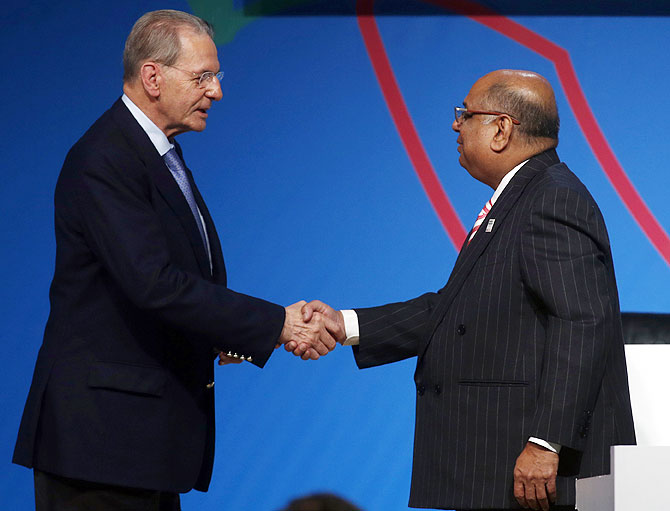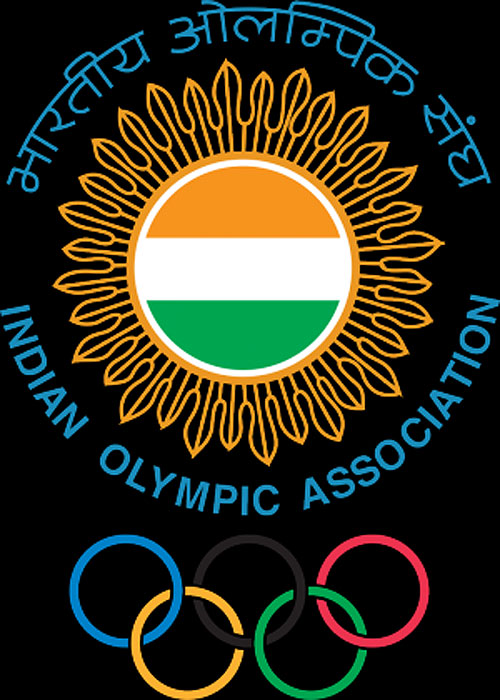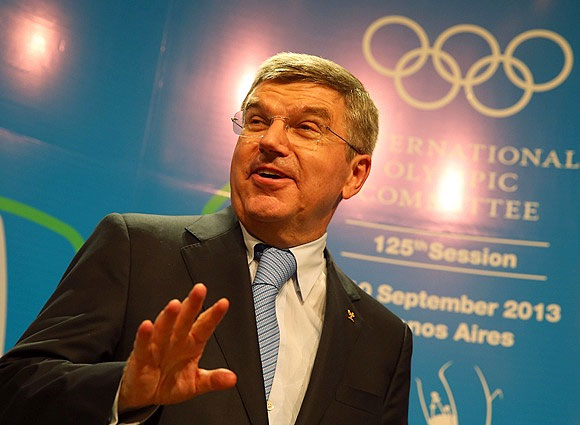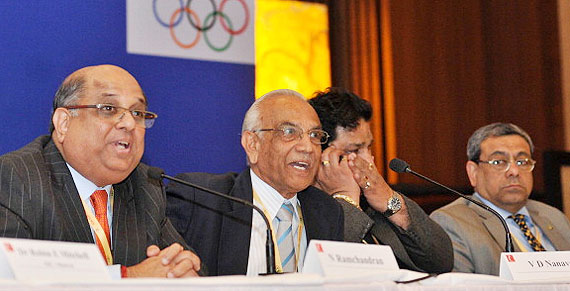 | « Back to article | Print this article |
Timeline: How India got reinstated into the Olympic fold
India returned to the Olympic fold after the International Olympic Committee lifted the ban on the country's Olympic association (IOA) on Tuesday. Its athletes will now be able to march behind the Indian flag at the closing ceremony of the Sochi Winter Games.
But India’s return wasn’t without its fair share of drama. Here is a summarised account of how the stage was set for India’s comeback.
It all started 14 months ago.
On December 4, 2012, the International Olympic Committee suspended the Indian Olympic Association for adhering to the government's Sports Code and allowing tainted persons -- Abhay Singh Chautala and Lalit Bhanot -- to participate in the election process.
Chautala and Bhanot were adamant about fighting the elections despite strong objections from the IOC.
In an act of defiance, the IOA went ahead with the polls a day after the Olympic suspension.
Click NEXT to read more...
Timeline: How India got reinstated into the Olympic fold
The world body hit back by refusing to recognise Chautala and his team of office-bearers.
The IOC later proposed a meeting with the IOA and government representatives, but clearly stated that the IOA must hold its elections solely under the Olympic Charter if it had to return to the Olympic fold.
Following three postponements and controversy over the participation of two members representing the suspended IOA, the meeting was scheduled for May 15, 2013, at Lausanne, Switzerland. Sports Minister Jitendra Singh and Beijing Olympics gold medal-winning shooter Abhinav Bindra attended the meeting.
Timeline: How India got reinstated into the Olympic fold
The IOC issued the road map for India's return to the Olympic fold, asking IOA to amend its constitution before July 15 and elect new office-bearers by September 1, both under the supervision of the world body.
On August 15, the IOC stated that tainted persons will no longer be eligible to contest the IOA elections.
However, a defiant IOA refused to implement the provision, saying that it had to follow the law of the land.
At a meeting on August 24, 2013, the IOA decided that only those who were convicted for a period of two years and more will not be allowed to run for IOA posts or be part of the Olympic movement.
For others, a soon-to-be formed Ethics Commission would look into their cases and forward its recommendations to the IOA Executive Council.
Timeline: How India got reinstated into the Olympic fold
The IOA even proposed to dilute the IOC’s contentious clause -- which deals specifically with the eligibility of members, asking the IOA to bar charge-sheeted persons from contesting elections -- stating the charge-sheet clause must apply only to convicted persons.
But the IOC shot down any compromise formula and asked the IOA to sack "charge-framed" officials through constitutional amendments by October 31 and conduct fresh elections by December 15, 2013.
On December 7, the IOA finally slammed its doors on corrupt officials, in a precariously late act of compliance to get the country's Olympic ban overturned.
The IOC subsequently offered a lifeline, and a December 9 deadline, for the dithering IOA to bar all tainted officials from contesting its elections.
Following the IOA's amendment to its constitution to exclude tainted officials from office, IOC president Thomas Bach said the change was a 'step in the right direction'.
Timeline: How India got reinstated into the Olympic fold
The IOC later agreed to the IOA's proposal of holding elections on February 9, after the latter agreed to bar charge-framed persons from contesting the polls.
After Sunday's elections, N Ramachandran was elected IOA president; Kho-Kho Federation of India president Rajeev Mehta and All India Tennis Association chief Anil Khanna were also elected unopposed as secretary-general and treasurer respectively in the polls, which marked the exit of the corruption-tainted Chautala and Bhanot from the IOA.
India was immediately reinstated into the Olympic fold after the IOC's three observers for the elections left Indian shores "satisfied with the IOA elections” on Sunday.




